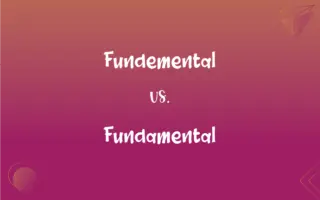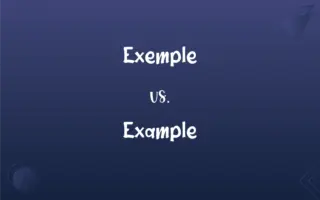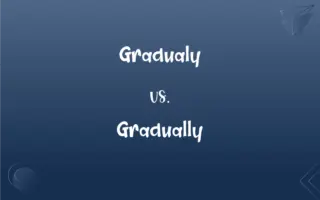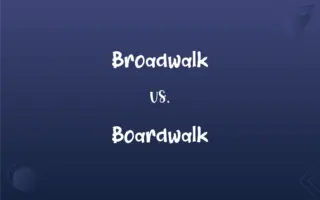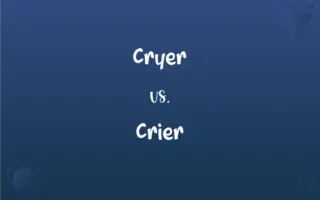Baloons vs. Balloons: Mastering the Correct Spelling
Edited by Aimie Carlson || By Janet White || Published on March 13, 2024
"Baloons" is incorrect, while "balloons" is the correct spelling, referring to flexible bags filled with gas, such as helium, for floating.
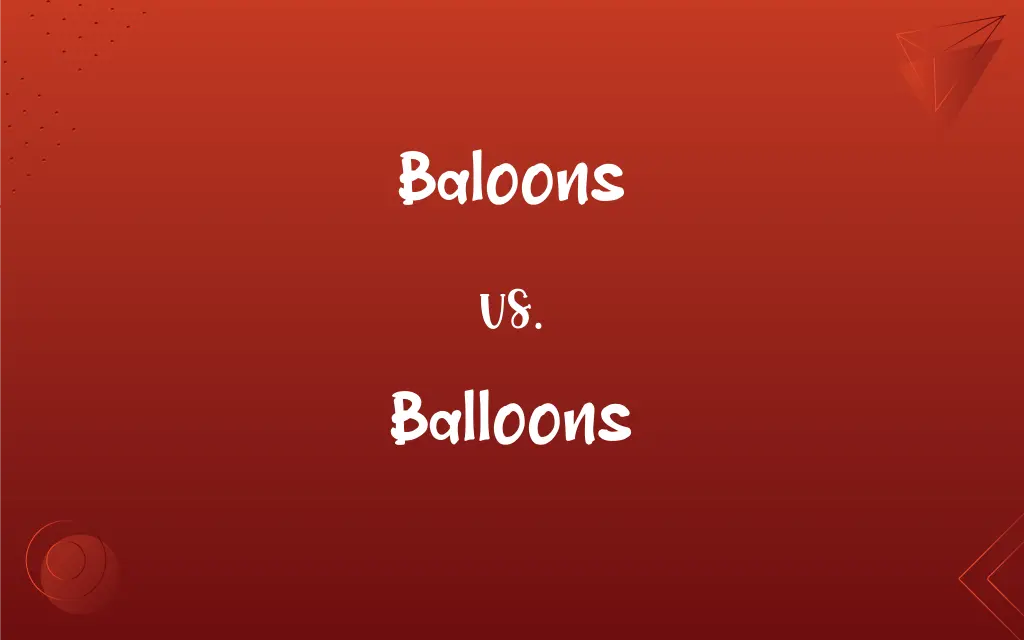
Which is correct: Baloons or Balloons
How to spell Balloons?

Baloons is Incorrect

Balloons is Correct
ADVERTISEMENT
Key Differences
Think of "balloons" having "double l" like they are doubling in size when inflated.
Use mnemonic: "Big Air Lifts Light Objects Onward Skyward" for "BALLOONS".
Picture "balloons" in the sky, making "oo" shapes as they float.
Associate "balloons" with "loon", a bird that also floats, to remember the "oo".
Remember, "balloons" carry "double o" as they carry air or helium.
ADVERTISEMENT
Correct usage of Balloons
He filled the baloons with helium so they would float.
He filled the balloons with helium so they would float.
The room was decorated with hundreds of baloons.
The room was decorated with hundreds of balloons.
She bought 50 baloons for the birthday party.
She bought 50 balloons for the birthday party.
The kids were excited to play with the colorful baloons.
The kids were excited to play with the colorful balloons.
Balloons Definitions
Inflatable objects that ascend in the atmosphere for meteorological or other research.
Weather balloons collect data high in the sky.
Flexible bags filled with gases like helium or air, used for decoration.
Colorful balloons decorated the party venue.
Used metaphorically to describe expansion or increase in size.
His ego balloons with every compliment.
Cartoon or speech bubbles in comics or graphic novels.
Dialogue balloons filled with witty banter.
Objects that symbolize celebration or commemoration in various events.
Graduation balloons were released to mark the occasion.
A flexible bag designed to be inflated with hot air or with a gas, such as helium, that is lighter than the surrounding air, causing it to rise and float in the atmosphere.
Balloons Sentences
Balloons in various shapes and colors adorned the entrance to the fair.
The balloons were released into the sky at the end of the celebration.
They watched as the parade featured giant balloons of cartoon characters.
The children squealed with delight as they played with the balloons.
The magician used balloons to make animal shapes for the children.
She tied balloons to the back of the chairs to add a festive touch.
The volunteers handed out balloons at the community event.
The science teacher explained how hot air balloons work.
The festival featured a spectacular hot air balloon show at dawn.
Balloons were used in the experiment to demonstrate static electricity.
The children made a game of keeping the balloons from touching the ground.
The announcement was made with a pop of confetti balloons.
Water balloons were a hit at the summer picnic.
She received a bouquet of balloons and flowers on her birthday.
They took pictures with the large 'Happy Birthday' balloons.
Biodegradable balloons were chosen for the outdoor event to protect the environment.
He surprised her with a room full of heart-shaped balloons.
They used balloons to mark the race's finish line.
At the wedding, each table centerpiece included elegant balloons.
The DIY kit included balloons to make your own party decorations.
The party store had a special on helium balloons.
The ceiling was covered with balloons, creating a magical atmosphere.
Balloons Idioms & Phrases
When balloons go up
An expression indicating that a situation is becoming serious or about to start.
When balloons go up, it's important to stay calm and focused.
FAQs
What is the root word of balloons?
The root word is "balloon", from the French "ballon", meaning large ball.
What is the pronunciation of balloons?
It is pronounced as /bəˈluːnz/.
Which vowel is used before balloons?
The vowel "o" is used before "o" in "balloons".
What is the plural form of balloons?
The plural form is "balloons".
Which preposition is used with balloons?
Prepositions like "with", "at", and "for" are used with "balloons".
What is the singular form of balloons?
The singular form is "balloon".
Which conjunction is used with balloons?
Conjunctions like "and", "or", and "but" can be used with "balloons".
What is the verb form of balloons?
The verb form is "balloon".
Which article is used with balloons?
The articles "a", "an", or "the" are used with "balloons".
Is balloons a negative or positive word?
"Balloons" is neutral; context determines its connotation.
Why is it called balloons?
Because they inflate or "balloon" out when filled with gas.
Is balloons a collective noun?
It can be used as a collective noun when referring to a group of balloons.
Is the balloons term a metaphor?
It can be used metaphorically to describe something that expands or increases.
Is balloons a noun or adjective?
"Balloons" is primarily a noun.
Is balloons an adverb?
No, "balloons" is not an adverb.
How many syllables are in balloons?
There are two syllables in "balloons".
What is the first form of balloons?
The first form is "balloon" as a verb.
How is balloons used in a sentence?
"The sky was filled with balloons during the festival."
Is balloons a vowel or consonant?
The word "balloons" starts with a consonant.
Is balloons a countable noun?
Yes, "balloons" is a countable noun.
Is the word balloons imperative?
"Balloon" can be imperative as a verb, but "balloons" as a noun is not.
How do we divide balloons into syllables?
It is divided as "bal-loons".
What part of speech is balloons?
"Balloons" is a noun.
What is the second form of balloons?
The second form is "ballooned".
What is the third form of balloons?
The third form is also "ballooned".
What is another term for balloons?
Another term could be "inflatables" or "airships" for larger types.
Which determiner is used with balloons?
Determiners like "some", "any", "these", "those" can be used with "balloons".
What is a stressed syllable in balloons?
The first syllable, "bal", is stressed.
What is the opposite of balloons?
Conceptually, the opposite could be "deflate" or "sink".
Is balloons an abstract noun?
No, "balloons" is a concrete noun.
About Author
Written by
Janet WhiteJanet White has been an esteemed writer and blogger for Difference Wiki. Holding a Master's degree in Science and Medical Journalism from the prestigious Boston University, she has consistently demonstrated her expertise and passion for her field. When she's not immersed in her work, Janet relishes her time exercising, delving into a good book, and cherishing moments with friends and family.
Edited by
Aimie CarlsonAimie Carlson, holding a master's degree in English literature, is a fervent English language enthusiast. She lends her writing talents to Difference Wiki, a prominent website that specializes in comparisons, offering readers insightful analyses that both captivate and inform.
